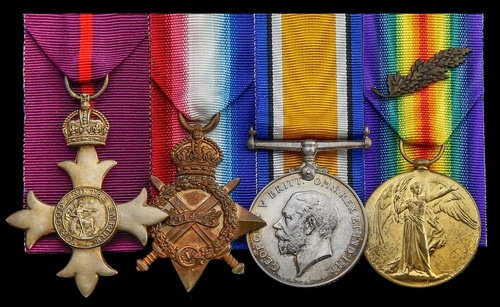
Auction: 17003 - Orders, Decorations and Medals
Lot: 689
A fine Great War Italy operations O.B.E. group of four awarded to Lieutenant-Colonel E. A. Gates, Royal Army Medical Corps, who earlier witnessed extensive active service as Medical Officer to the 25th (Legion of Frontiersmen) Battalion, Royal Fusiliers - a.k.a. 'Dricoll's Tigers' - in East Africa 1915-17
The Most Excellent Order of the British Empire, (O.B.E.), Military Division, Officer's 1st type breast badge, silver-gilt, hallmarks for London 1919; 1914-15 Star (Lieut. E. A. Gates, R.A.M.C.); British War and Victory Medals, M.I.D. oak leaf (Lt. Col. E. A. Gates); Italy, Armata Altipiani Medal 1918, silver, on original silk riband, good very fine and better (5)
O.B.E. London Gazette 3 June 1919.
Edward Alfred Gates was born on 16 April 1874, the son of Philip Chasemore Gates, K.C., J.P., Recorder of Brighton. Educated at Westminster School and University College London, Edward qualified as a doctor at St. Thomas's Hospital in August 1898.
Having in the interim served as a House Surgeon and Physician at St. Thomas's, he served as a Civil Surgeon to the Egyptian Army 1900-02 and practiced in Florence, Italy from 1905 until the outbreak of hostilities in August 1914. Returning home in the latter month, he was commissioned Lieutenant in the Royal Army Medical Corps and attached as M.O. to the 25th (Legion of Frontiersmen) Battalion, Royal Fusiliers.
Driscoll's Tigers
The Battalion was commanded by Colonel D. P. Driscoll, D.S.O. - hence its informal title 'Driscoll's Tigers' - and by normal standards it was an exceptional one. Driscoll deliberately enlisted specialists, among them the famous explorer and hunter, 64-year-old F. C. Selous, in addition to other well-known African hunters such as Martin Ryan, George Outram and Jock Richardson. By early 1915 the reputation of the Battalion was such that a number of men deserted their own units to join the 'Tigers' as they departed Waterloo Station for East Africa; some of them were apprehended by the Police but others made it aboard the departing train and sailed with their new-found comrades for Mombasa in the Neuralia.
Gates was to remain with the 'Tigers' throughout the East African campaign 1915-17, a challenging theatre of war that witnessed numerous cases of malaria and illness, in addition to battle casualties. Having landed at Mombasa in April 1915, the Battalion, accompanied by soldiers of the K.A.R. and 1st Battalion, Loyal North Lancashires, departed Kisumu by steamer and sailed 240 miles across Lake Victoria to attack the German port of Bokoba; this was reached on 20 June 1915 and, following a sharp action against the Germans and their Arab allies, was captured.
Following the action at Bokoba, the 'Tigers' were assigned to railway protection duties and it was in this capacity that Lieutenant W. Dartnell won a posthumous V.C. at Maktau in September, when his position was attacked by a force of some 200 Germans and Askaris. Resultant casualties would undoubtedly have kept Gates busy, as indeed did the ever-growing number of malaria cases.
Some fascinating glimpses of Gates at work are to be found in the unit's war diary for this period, including references to him joining offensives patrols. Thus his joining a 'flying column' in late December 1915, under Major White and F. C. Selous, a column charged with protecting the Uganda railway: it subsequently fought an action at Ngurangani, in which three of its men were killed and four wounded.
In early 1916, after the arrival of reinforcements, the 'Tigers' went into action in the Handeni area, where two companies under Major White stormed an enemy position with great gallantry at the point of the bayonet. Further actions were to follow around Mount Kilimanjaro but most 'Tigers' considered the engagement at Beho-Beho in January 1917 as their most memorable. This was the occasion on which F. C. Selous was mortally wounded, as a consequence of which his surviving comrades avenged his death in spectacular fashion, driving the enemy back across the Rufugi.
Having then displayed comparable gallantry in fierce fighting at Ziwani and Tandamuti, the 'Tigers' were back in action at the battle at Narunyu in August 1917, when they defended themselves against overwhelming odds for a period of five days, by means of adopting a square. Greater challenges were to follow at Nyangao in mid-October, when the Battalion was all but wiped out: it was ordered home and disbanded.
Italy and beyond
Gates, who was mentioned in despatches (London Gazette 8 February 1917, refers), subsequently served as a Consulting Physician (Forward Area) in Italy from April to November 1918, in which capacity he held the acting rank of Lieutenant-Colonel and received a second mention in despatches (London Gazette 12 November 1919, refers), in addition to the O.B.E.
On returning to civilian life after the war, he served as a Medical Specialist on the Appeal Board of the Ministry of Pensions 1919-22, prior to being appointed a Junior Member of the Egyptian Medical Board (London) in the early 1920s. He remained likewise employed until 1950, serving as a Senior Member of the Board from 1930, in addition to undertaking duties as Medical Officer of Westminster School. He died in Salisbury, Wiltshire in July 1965; sold with a file of copied research.
Subject to 20% VAT on Buyer’s Premium. For more information please view Terms and Conditions for Buyers.
Sold for
£450




